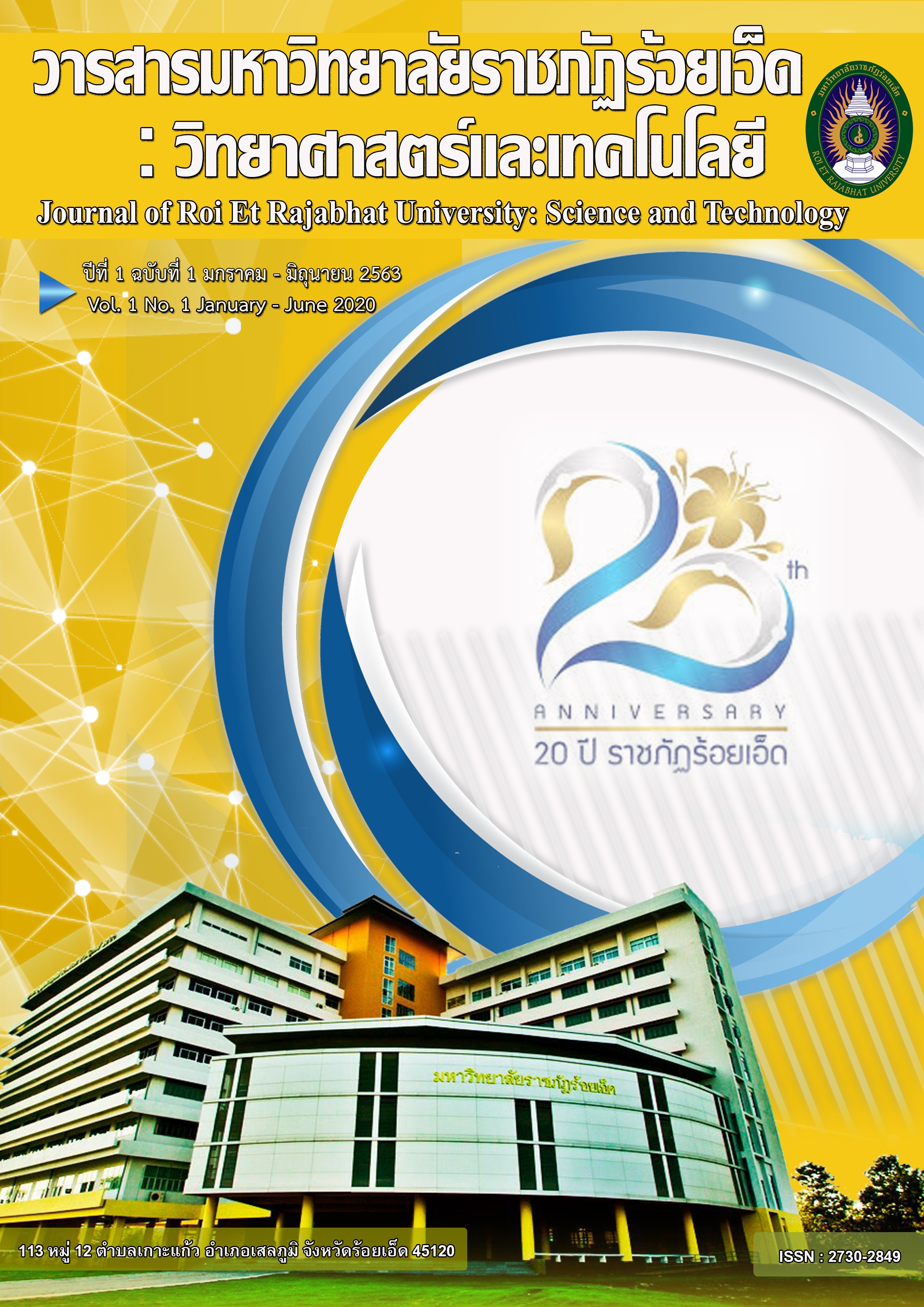แนวคิดทุนคนไทยกับการจัดการเกษตรอินทรีย์สู่เกษตรเชิงก้าวหน้า กรณีศึกษาม่วนใจ๋ กลุ่มเกษตรอินทรีย์วิถีธรรมชาติเชียงดาว จังหวัดเชียงใหม่
คำสำคัญ:
เกษตรเชิงก้าวหน้า, ทุนคนไทย, เกษตรอินทรีย์บทคัดย่อ
การวิจัยนี้มีวัตถุประสงค์เพื่อศึกษาแนวคิดทุนคนไทยที่นำมาใช้ในการจัดการเกษตรอินทรีย์สู่เกษตรเชิงก้าวหน้า และเพื่อทราบปัญหาและอุปสรรคของการจัดการเกษตรอินทรีย์สู่เกษตรเชิงก้าวหน้า กลุ่มผู้ประกอบการเกษตรอินทรีย์ วิถีธรรมชาติเชียงดาว จังหวัดเชียงใหม่ ใช้กระบวนกวนการวิจัยเชิงคุณภาพ โดยการสัมภาษณ์เชิงลึกและการสังเกตแบบมีส่วนร่วม เชิงปฏิบัติในการลงพื้นที่จริง เป็นระยะเวลา 1 เดือน ผู้ให้ข้อมูลสำคัญ คือ ผู้นำกลุ่มผู้ประกอบการม่วนใจ๋ จำนวน 11 คน โดยเลือกแบบเจาะจง เครื่องมือที่ใช้ในการเก็บรวบรวมข้อมูล ประกอบด้วย แบบสัมภาษณ์กึ่งโครงสร้าง การบันทึกรายละเอียด ภาพและเสียงการสนทนา วิเคราะห์ข้อมูลเชิงเนื้อหา และสังเคราะห์ข้อมูลเชิงพรรณนา และผลการวิจัยพบว่า กลุ่มผู้ประกอบการ ม่วนใจ๋มีวิสัยทัศน์ในการทำเกษตรอินทรีย์วิถีธรรมชาติเชียงดาวที่สอดคล้องกับแนวคิดทุนคนไทย ที่สามารถดึงภูมิปัญญาดั้งเดิม ด้านการเกษตรมาประยุกต์ใช้ร่วมกับเทคโนโลยีในการพัฒนากระบวนการผลิตและแปรรูปสินค้าเกษตรอินทรีย์ที่มีมาตรฐาน และเหมาะสมกับบริบทของสภาพแวดล้อมในชุมชน ซึ่งปัญหาและอุปสรรคที่ค้นพบ คือ กระบวนการปรับทัศนคติและ การเปลี่ยนแปลงพฤติกรรมที่มีต่อการทำเกษตรอินทรีย์ การออกแบบกิจกรรมเกษตรอินทรีย์ การพัฒนากระบวนการผลิตและ แปรรูปสินค้าเกษตรอินทรีย์เพื่อยกระดับคุณภาพของสินค้าตามมาตรฐานสากลและสร้างภาพลักษณ์ที่ดีแก่สินค้าเกษตรอินทรีย์ อย่างยั่งยืน ทั้งนี้ แนวทางในการจัดการเกษตรอินทรีย์และวิธีการลดปัญหาอุปสรรคได้เสนอในรายละเอียดต่อไป
เอกสารอ้างอิง
Department of National Parks, Wildlife and Plant Conservation. (2010). The natural study, learning about Warm Vegetation and Sub-alpine Vegetation plant society on Chiang Dao. [online]. [Accessed March 18, 2020]. Available from: URL: http://web3.dnp.go.th. (in Thai)
Duangsonk, J., Taechamaneestit, T. and Maneeroj. P. (2015). The study organizational development of social enterprise in organic agriculture in Northern Thailand: The case study of Rainbow farm. Journal of Management Science Chiangrai Rajabhat University. Vol.10 No.2 (July-December 2015). 140-164 pp. (in Thai)
Green Net. (2019). Organic agriculture approach. [online]. [Accessed March 21, 2020]. Available from: URL: https://www.greennet.or.th. (in Thai)
Hangsoongnern, T., Angkasith, P., Opatpatanakit, A. and Sirisunyluck, R. (2014). Organic farming system in the context of sufficiency economy: Case study of organic farmers in Mae Rim Watershed, Chiang Mai Province. Journal of Agriculture. Vol.30 No.1 (January 2014). 61-69 pp. (in Thai)
Jun-iad, J. (2009). Short-course training to accomplished in organic agriculture. Princess of Naradhiwas University Journal. Vol.1 No.2 (May-August 2009). 114-125 pp. (in Thai)
Ketpirune, O. (2012). Persuasion in planting organic rice with research. Journal of Community Development Research. 5(1): 113-124. (in Thai)
Kittikhunpisarn, S. (2019). Manager of Suan Buachompoo Na Jomkiree. Mae Na Sub-district. Chiang Doa District. Chiang Mai Province. [Interviewed December, 2019]. (in Thai)
Kongjinda, T. (2013). Crofters’ acceptance of organic farming in the area of Khom Bang Sub-district administration organization Chanthaburi Province. Master of Public Administration Program in Local Government. Rambhai Barni Rajabhat University. 1-99 pp. (in Thai)
Laowongsri, K., Tithithavorn, A. and Laosaparn, A. (2016). Agricultural philosopher of the land (2016). Division of Technology Policy for Agriculture and Sustainable Agriculture, Office of the Permanent Secretary for Agriculture and Cooperatives. [online]. [Accessed January, 2020]. Available from: URL: https://www.moac.go.th/philosopher-download. 1-46 pp. (in Thai)
Luangsomboon, R. (2019). Business plan for Thursday Organic Farming. Master of Business Administration Program in Small and Medium – Sized Enterprises. Graduate School. Bangkok University. [online]. [Accessed January 22, 2019]. Available from: URL: http://dspace.bu.ac.th/jspui/handle/123456789/3751. 1-84 pp. (in Thai)
Meksuwan, A., Wingwon, B. and Sangkhawan, J. (2016). Effect of intellectual capital, marketing capability, participation toward business performance of Hand-Woven Cloth community enterprises in Upper Northern Region of Thailand. Journal of Graduate Studies in Northern Rajabhat Universities. Vol.6 No.11 (July-December 2016). 111-124 pp. (in Thai)
Muenjanchoey, R. (2014). Cultural capital for Thai Song Dam’s development in Nakhon Pathom Province. Doctoral of Philosophy in Development Education Department of Education Foundations. Graduate School. Silpakorn University. 1-391 pp. (inThai)
Na Songkhla, T. (2013). Model of agricultural resource management for sustainable Agro-tourism in Changklang District, Nakorn Si Tammarat Province. Doctoral of Philosophy Program in Tropical Agricultural Resource Management. Prince of Songkla University. 1-215 pp. (in Thai)
Phoomsirirattanawadi, Y. (2013). Why “Thainess”. [online]. [Accessed March 17, 2020]. Available from: URL: https://www.thainesscapital.com. (in Thai)
Promsaka Na Sakonnakhon, V., Jutaviriya, K. and Chamruspanth, V. (2017). Natural resource management by social capital within the system of contract farming. Journal of Graduate Volunteer Centre. Vol.13 No.2 (January-Jane 2017). 190-238 pp. (in Thai)
Sakkatat, P. and Kungwon, S. (2016). Using cluster analysis to group villages for promoting organic agriculture in Chiang Mai Province. Journal of Agriculture. Vol.32 No.2 (May 2016). 201-207 pp. (in Thai)
Srigiofun, Y., Meckhayal, T., Bhackdee, K., Suwan, K., Tassanakowit, U., Innongchang, S. and Lomlai, S. (2012). Promoting organic agriculture and integrated pest management of San-sai farmers, Chiang Mai Province. Maejo University. 1-160 pp. (in Thai)
Sriprasert, W. (2016). Knowledge management development on organic agriculture marketing of farmer group, Makha sub-district, Kantharawichai district, Maha Sarakham province. Research and Development Journal, Loei Rajabhat University. Vol.11 No.36 (April-Jane 2016). 103-114 pp. (in Thai)
Tancho, A. (2007). Agriculture systems in Thailand: Modern agriculture or Chemical agriculture. Kasetthan Maejo information center. Soil Resource and Environment. Faculty of Agricultural Production, Maejo University [online]. [Accessed March 25, 2020]. Available from: URL: https://www.maejonaturalfarming.org. (in Thai)
Thainess strategic committee. (2019). [online]. [Accessed March 17, 2020]. Available from: URL: http://www.xn--k3ciceh0czgoa1m.com/inspiration. (in Thai)
Vongchaisit, L. (2019). The development of modern agriculture according to Thailand 4.0 policy, Organic vegetable case study. National Defence College. The National Defence Course Class 59 (2016-2017). 1-85 pp. (in Thai)
Yossuk, P. and Kawichai, P. (2017). Problems and appropriate approaches to implementing organic Agriculture policy in Thailand. Journal of Community Development and Life Quality. Vol.5 No.1 (January-April 2017). 129-141 pp. (in Thai)
Yusamran, P.P. and Neawheangtham, R.K. (2018). The model development of social capital management in community sustainable development. Panyapiwat Journal. Vol.10 No.2 (May August 2018). 187-199 pp. (in Thai)
ดาวน์โหลด
เผยแพร่แล้ว
รูปแบบการอ้างอิง
ฉบับ
ประเภทบทความ
สัญญาอนุญาต
บทความที่ได้รับการตีพิมพ์เป็นลิขสิทธิ์ของคณะศิลปศาสตร์และวิทยาศาสตร์ มหาวิทยาลัยราชภัฏร้อยเอ็ด
ข้อความที่ปรากฏในบทความแต่ละเรื่องในวารสารวิชาการเล่มนี้เป็นความคิดเห็นส่วนตัวของผู้เขียนแต่ละท่านไม่เกี่ยวข้องกับมหาวิทยาลัยราชภัฎร้อยเอ็ด และคณาจารย์ท่านอื่นๆในมหาวิทยาลัยฯ แต่อย่างใด ความรับผิดชอบองค์ประกอบทั้งหมดของบทความแต่ละเรื่องเป็นของผู้เขียนแต่ละท่าน หากมีความผิดพลาดใดๆ ผู้เขียนแต่ละท่านจะรับผิดชอบบทความของตนเองแต่ผู้เดียว






